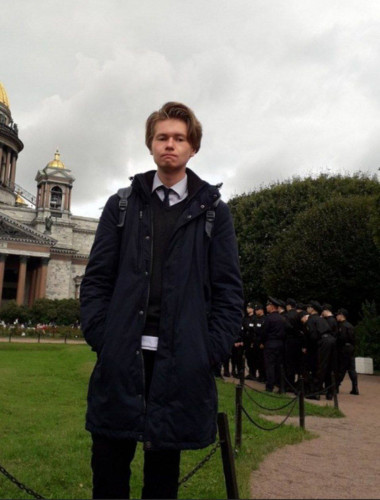Andrei Kozlovsky and Daniil Golikov are political prisoners
Two young Moscow residents have been sentenced to terms of imprisonment for damaging an unofficial memorial ‘to all those who died during the Russian Spring and the Special Military Operation’
The ‘Political Prisoners. Memorial’ human rights project, in accordance with international standards, considers Andrei Kozlovsky and Daniil Golikov political prisoners. Kozlovsky and Golikov were convicted on charges of group vandalism and of damaging a memorial structure for spoiling a number of items at an informal street memorial dedicated to participants in the ‘Special Military Operation’ and pro-Russian activists in Ukraine. The criminal proceedings against the young men violated their right to a fair trial. We call for the immediate release of Kozlovsky and Golikov and that all criminal charges against them be dropped.
What were the charges against Andrei Kozlovsky and Daniil Golikov?
According to the investigative authorities, on the night of 10–11 March 2024, 28-year-old Andrei Kozlovsky and 26-year-old Daniil Golikov damaged several flower vases, funeral wreaths and lamps that formed part of an informal ‘Z-memorial’ on Moscow’s Varvarka Street.
On the morning of 13 March, Kozlovsky and Golikov were detained and the following day sentenced to 15 days in jail on administrative-law charges of ‘failure to comply with the lawful order of a police officer.’ However, dissatisfied pro-government ‘Z-activists’ then filed multiple complaints and succeeded in having criminal charges brought against the two men of ‘vandalism committed by a group of people’ (Article 214, Part 2, of the Russian Criminal Code) and ‘damaging a memorial structure commemorating those who died defending the Fatherland’ (Article 243.4, Part 2).
Kozlovsky and Golikov were placed under house arrest on 29 March. Experts brought in by the investigative authorities – including art historians and psychologists – concluded that the Z-memorial had ‘enormous socio-cultural and patriotic value’ and ‘historical significance’ and was ‘linked to heroic events.’ An activist of the Russian Spring Generation movement was recognised as a victim in the case.
Golikov fully admitted guilt, citing an emotional breakdown because of personal circumstances; Kozlovsky admitted guilt in part. The two men fully compensated for the damage, which was assessed at 55,372 roubles, and apologised to the victim.
Nevertheless, on 18 November 2024, the two men were sentenced to terms of imprisonment in low-security penal colonies. Daniil Golikov was given two and a half years, and Andrei Kozlovsky three years. On July 8 2025, an appeal court reduced their prison sentences to two years in low-security penal colonies for each of them.
Why do we consider Andrei Kozlovsky and Daniil Golikov political prisoners?
The memorial that Golikov and Kozlovsky were accused of damaging does not commemorate ‘defenders of the Fatherland or its interests,’ but rather individuals involved either in internal conflict in Ukraine or in Russia’s criminal war of aggression against that sovereign state. It does not have any ‘cultural or patriotic significance’ and is not an officially designated memorial. The authorities failed to prove that the defendants intended to damage an object of ‘historical or cultural value.’
The use of two separate criminal charges is both incorrect and disproportionate. Given that the damage was fully compensated and caused no permanent harm, the case should have been dropped as trivial.
The actions of Kozlovsky and Golikov were spontaneous and, at most, might have been considered an administrative offence. However, under pressure from pro-government ‘Z-activists,’ the judicial proceedings were politicised, resulting in an excessively harsh sentence.
Imprisonment for overturning vases and scattering flowers is disproportionate to the alleged harm caused to society and is explained by the fact that the prosecution of Kozlovsky and Golikov was politically motivated.
A detailed description of Kozlovsky’s and Golikov’s case and of our position is available on our website.
Recognition of an individual as a political prisoner does not imply the ‘Political Prisoners. Memorial’ human rights project agrees with, or approves, their views, statements, or actions.
How can you help?
If you have information about the current places of detention of Andrei Kozlovsky or Daniil Golikov, please contact us via our Telegram bot or by email at: [email protected].
You can donate to help all political prisoners in Russia.

